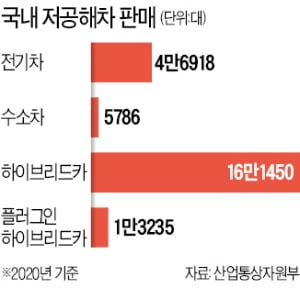Government “Excluding low-emission vehicles in 2023”
“Are you responsible for declining used car prices?”
When the government decided to exclude hybrid cars (HEVs) from eco-friendly cars from 2023, hybrid car owners are in anguish. The government bought it because it was an eco-friendly car, but it makes no sense to change the policy suddenly, raising a voice that the government will take responsibility if the price of used cars falls.
▶A1 as of March 5th, See page 4

The Ministry of Environment is reviewing a plan to change the definition of’low-pollution vehicle’ in the Enforcement Decree of the Air Environment Conservation Act to reduce greenhouse gas emissions. Currently, we are discussing the direction of leaving only electric vehicles, hydrogen vehicles, solar vehicles, and plug-in hybrid cars (PHEV) by significantly reducing the range of low-emission vehicles, including liquefied petroleum gas (LPG) vehicles, divided into 1-3 types. The plan is to revise the enforcement decree next year and apply it from 2023.
When the Korea Economic Daily reported this, hybrid car owners were bewildered. “I chose a hybrid car that is 4 to 5 million won more expensive than gasoline cars in consideration of benefits such as discounts on public parking lots. Does this make sense?” “Check out how many electric vehicle charging stations are in the apartment basement parking lot right now.” . There is even a story saying, “I can hear the sound of falling used hybrid car prices.” There is also a response that “a predictable procedure for expanding the supply of electric and hydrogen vehicles”.
Ministry of Environment officials explained, “The reduction of low-emission vehicle models was already announced by the announcement of the comprehensive plan for fine dust management in 2019, two years ago.” At the time, the Ministry of Environment announced that the vehicle models subject to the low-emission vehicle distribution target system were “plans to reduce the range of vehicle models from 2023, including hybrid, gas, and gasoline vehicles by 2022, taking into account the industrial preparation period.”
The low-emission vehicle supply target system is a system in which automakers impose contributions (de facto fines) if they cannot fill a certain percentage of their sales with low-emission vehicles. The government is also pursuing infrastructure expansion by increasing the number of fast chargers for electric vehicles, which are at the level of 10,000, to 20,000 by 2030.
The reason why existing hybrid car owners, not automakers, pay attention to the range of vehicle types is that if the definition of a low-emission vehicle changes according to the enforcement ordinance, the hybrid car benefits of each local government that apply it mutatis mutandis may disappear. The Ministry of Trade, Industry and Energy announced a different position from the Ministry of Environment, saying, “We plan to foster hybrid cars as a practical alternative to GHG reduction” through explanatory data.
Reporter Eun-seo Koo [email protected]
Ⓒ Hankyung.com prohibits unauthorized reproduction and redistribution
